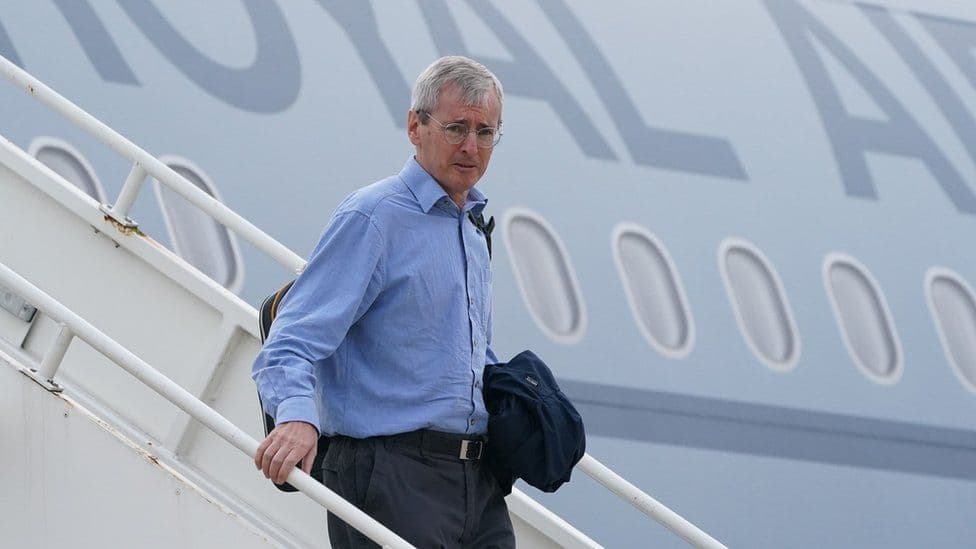The British ambassador to Afghanistan has arrived in the UK, with the last British soldiers to leave Kabul expected to touch down within hours.
The final flight left on Saturday, bringing to an end the UK’s 20-year military involvement in Afghanistan.
More than 15,000 people have been evacuated by the UK since 14 August.
Vice Adm Sir Ben Key, who ran the UK’s evacuation, said he would be “very nervous” in saying the withdrawal was a success until all the allies had left.
He said it had been a “tremendous international effort” but it wasn’t “a moment of celebration for us at all”, adding that there was a “sense of sadness” at those left behind.
Prime Minister Boris Johnson said the UK’s departure was “the culmination of a mission unlike anything we’ve seen in our lifetimes”.
Ambassador Sir Laurie Bristow, who had been processing those fleeing the country at the airport, was among those who landed at RAF Brize Norton base in Oxfordshire on Sunday morning.
The flight came via the United Arab Emirates and further flights carrying military and civilian personnel are expected later.
Farthing and animals ‘safe’ after leaving Kabul
Afghan fleeing to UK gives birth at 30,000 feet
‘Taliban killed my brother for protecting my family‘
Vice Adm Key, chief of joint operations, said that while he “pays testament” to everything achieved by British forces over the last two weeks, “we know that there are some really sad stories of people who have desperately tried to leave that – no matter how hard our efforts – we have been unsuccessful in evacuating”.
Speaking at RAF Brize Norton, he said the 31 August deadline imposed by the Taliban prevented them evacuating more people “who had helped us so wonderfully and courageously over the last 20 years”.
Photos of exhausted UK service personnel in aircraft coming back from Kabul showed how “deeply tired” they were having “given their all over the last two weeks”, he said.
“Some of the pictures that have come back in the last few days have painted a really good impression of just how desperate and difficult those conditions have been in the last few weeks.
“They have been sleeping in rough conditions, eating off ration packs and their sole motivation has been to help as many of the Afghans and British entitled personnel as they possibly could.”
He added that he had the most “enormous admiration” for what British troops had done.
What happens to Afghan refugees coming to the UK?
Arrivals on official flights enter a 10-day Covid quarantine in a hotel
Government officials and local authorities are trying to find them permanent homes
A shortage of suitable accommodation means many will be placed in hotels
Some will get refugee status and can live in the UK permanently
Others will get a five-year visa to live and work in the UK – and can then apply for permanent residence
Afghans arriving independently will enter the normal system for asylum claims – which has a backlog of 70,000 people
These people cannot settle, or work, while their claims are considered line
A new plan to resettle people fleeing Afghanistan, called Operation Warm Welcome, has been announced by the government.
It will be modelled on a similar scheme put in place for Syrian refugees – 20,000 of which came to the UK between 2014 and 2020.
Support will include help with integration and dealing with trauma, free English language courses, and assistance with health, education, accommodation and employment.
The UK government has two schemes to resettle Afghans – the Afghan Relocations and Assistance Policy (ARAP) for those who worked for the UK government; and the Afghan Citizens’ Resettlement Scheme, which focuses on women and children, as well as religious and other minorities.

